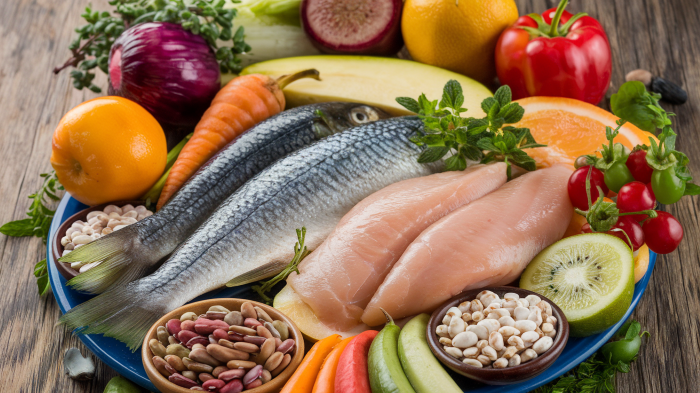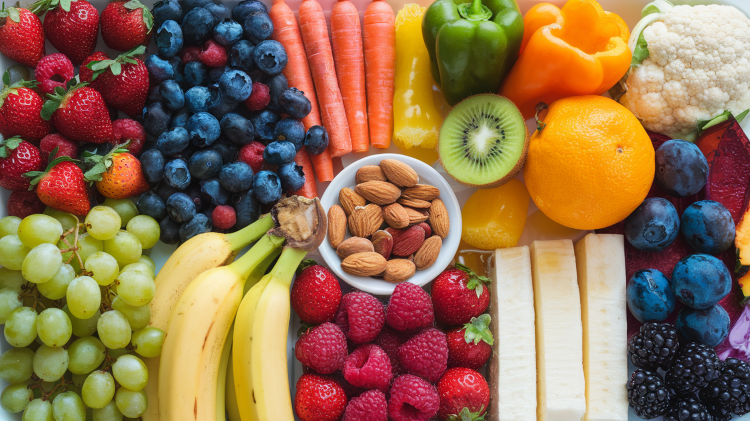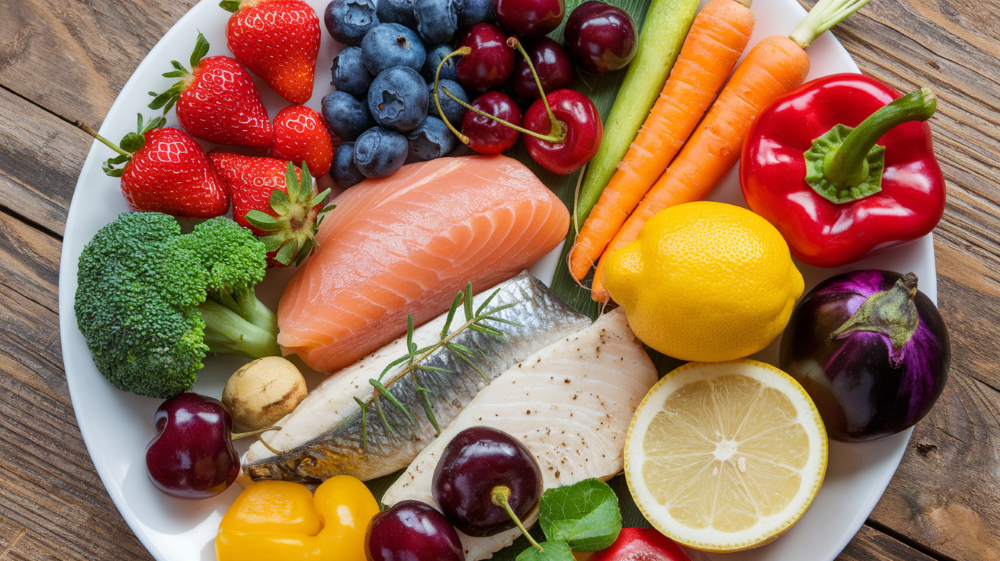As we age, our bodies require different nutrients to stay healthy and strong.
Older adults often face unique challenges when it comes to getting the right vitamins and minerals from their diet.
Many seniors experience decreased appetite, changes in taste and smell, and difficulty chewing or swallowing.

Amazon Affiliate Disclaimer
We participate in the Amazon Services LLC Associates Program, an affiliate marketing program that allows us to earn fees by linking to Amazon.com and its affiliated sites. If you click on an Amazon affiliate link on our site and make a purchase, we may receive a small commission at no additional cost to you.
Eating nutrient-rich foods is crucial for healthy aging and can help prevent or manage chronic conditions common in older adults.
Some key nutrients that seniors need include protein, calcium, vitamin D, vitamin B12, and fiber. These nutrients support bone health, muscle strength, cognitive function, and digestive health.
Getting enough of these essential nutrients doesn't have to be complicated or expensive. Many everyday foods like eggs, milk, lean meats, fish, fruits, and vegetables provide the vitamins and minerals older adults need.
For those who struggle to meet their nutritional needs through diet alone, supplements may be recommended by a healthcare provider.
It's important for seniors to work with their doctors to determine the best approach for their individual needs and health conditions.
Nutritional Challenges in Older Adults
As people age, they face unique nutritional hurdles. These challenges can make it harder to get the right nutrients and stay healthy.
Let's look at some key issues older adults often deal with.
Decreased Appetite and Absorption
Many older adults eat less as they get older. This can happen for several reasons:
- Changes in taste and smell
- Dental problems
- Side effects from medicines
- Feeling lonely or sad
The body also doesn't absorb nutrients as well. This means even if an older person eats the same amount, they might not get as much good from their food.
Eating smaller meals more often can help. Adding spices or herbs to food may make it taste better. Eating with others can also make meals more fun.
Risk of Nutrient Deficiencies
Older adults are more likely to lack important nutrients. Common deficiencies include:
- Vitamin B12
- Vitamin D
- Calcium
- Iron
These gaps can lead to health problems. For example, not enough calcium can weaken bones. Too little vitamin B12 might cause memory issues.
Regular check-ups with a healthcare provider can catch these problems early. Blood tests can show if someone needs more of certain nutrients.
Some older adults may need to take supplements. But it's best to talk to a doctor first.
Chronic Health Conditions' Impact on Diet
Many older adults have long-term health issues. These can affect what they eat:
- Diabetes might mean watching sugar intake
- Heart disease often requires a low-salt diet
- Kidney problems can limit certain foods
Managing these diets can be tricky.
It's important to work with a doctor or dietitian. They can help create a meal plan that fits specific health needs.
Some medicines can also change how the body uses nutrients. This is another reason to talk with a healthcare provider about diet.
Essential Nutrients for Bone and Muscle Health
As we age, certain nutrients become crucial for maintaining strong bones and healthy muscles. These key nutrients help prevent osteoporosis, support muscle function, and promote overall skeletal health.
Calcium and Vitamin D for Osteoporosis Prevention
Calcium is essential for strong bones and teeth. It also plays a vital role in nerve function and muscle movements.
Older adults need to pay extra attention to their calcium intake to prevent bone loss.
Vitamin D works hand in hand with calcium. It helps the body absorb and use calcium effectively. Without enough vitamin D, calcium can't do its job properly.
Good sources of calcium include:
- Dairy products
- Leafy green vegetables
- Fortified foods
Vitamin D can be obtained from:
- Sunlight exposure
- Fatty fish
- Egg yolks
- Fortified foods
Older adults may need supplements to meet their calcium and vitamin D needs, especially if they have limited sun exposure or dietary restrictions.
Protein for Muscle Maintenance
Protein is crucial for maintaining muscle mass as people age. It helps repair and build muscle tissue, which naturally decreases over time.
Older adults often need more protein than younger people to maintain muscle strength and function.
Good protein sources include:
- Lean meats
- Fish
- Eggs
- Dairy products
- Legumes
- Nuts and seeds
Spreading protein intake throughout the day can help maximize its benefits for muscle health.
Magnesium and Vitamin B12

Magnesium is important for bone health and muscle function. It helps regulate calcium levels in the body and supports bone mineralization.
Good magnesium sources include:
- Nuts and seeds
- Whole grains
- Leafy green vegetables
Vitamin B12 is essential for nerve function and red blood cell formation. As people age, their ability to absorb B12 often decreases.
B12 can be found in:
- Animal products
- Fortified foods
Older adults may need B12 supplements, especially if they follow a vegetarian or vegan diet. Regular blood tests can help detect B12 deficiency and guide treatment.
Heart-Healthy Foods and Nutrients

Eating the right foods can help older adults maintain a healthy heart. A balanced diet rich in specific nutrients supports cardiovascular health and may reduce the risk of heart disease.
Managing Blood Pressure and Cholesterol
High blood pressure is a common concern for seniors.
Foods low in sodium and high in potassium can help control blood pressure. Potassium-rich options include bananas, sweet potatoes, and spinach.
To manage cholesterol, seniors should focus on foods high in soluble fiber. Oatmeal, beans, and apples are excellent choices. These foods help lower LDL (bad) cholesterol levels.
Omega-3 fatty acids, found in fatty fish like salmon and sardines, can also improve heart health. Experts recommend eating fish twice a week.
Importance of Fruits, Vegetables, and Whole Grains
Fruits and vegetables are packed with vitamins, minerals, and antioxidants that support heart health. Berries, citrus fruits, and leafy greens are particularly beneficial.
Seniors should aim for a variety of colorful produce in their diet. This ensures a wide range of nutrients.
Whole grains provide fiber and other important nutrients. Options include:
- Brown rice
- Quinoa
- Whole wheat bread
- Oats
These foods help maintain healthy blood sugar levels and reduce the risk of heart disease.
Balanced Fats for Cardiovascular Health
Not all fats are bad for heart health. Older adults should focus on consuming healthy fats in moderation.
Monounsaturated fats, found in olive oil and avocados, can help lower bad cholesterol. Nuts and seeds provide heart-healthy fats and protein.
It's important to limit saturated and trans fats, which can raise cholesterol levels. Seniors should avoid processed foods and opt for lean proteins instead.
Portion control is key when it comes to fats. Even healthy fats are high in calories and should be consumed in moderation.
Hydration and Healthy Digestion
Proper hydration and fiber intake play key roles in maintaining digestive health for older adults. These elements work together to support regular bowel movements and prevent issues like constipation.
Adequate Water Intake
Older adults need to drink enough fluids each day. Water helps move food through the digestive system and prevents constipation. Aim for 6-8 cups of fluids daily.
Staying hydrated is crucial for digestion and nutrient absorption.
Choose water, unsweetened fruit juices, and low-fat milk. These options provide hydration without extra calories.
Dehydration can be dangerous for seniors. Signs include dark urine, dry mouth, and dizziness. Keep water easily accessible to encourage regular sipping throughout the day.
Fiber for Digestive Health
Fiber is essential for healthy digestion in older adults. It helps prevent constipation and promotes regular bowel movements. Aim for 25-30 grams of fiber daily.
Good fiber sources include:
- Whole grains (oats, brown rice)
- Fruits (apples, berries)
- Vegetables (broccoli, carrots)
- Legumes (beans, lentils)
Increase fiber intake gradually to avoid discomfort. Drink plenty of water with high-fiber foods to help them move through the digestive system.
Fiber also feeds beneficial gut bacteria, supporting overall digestive health. It can help manage blood sugar levels and promote heart health in older adults.
Strategies for Eating Healthy

Eating well as we age requires some planning and effort. These strategies can help older adults meet their nutritional needs and maintain good health.
Following Dietary Guidelines
Dietary guidelines provide a roadmap for healthy eating. The USDA's MyPlate is a helpful tool for seniors. It suggests filling half the plate with fruits and vegetables.
Whole grains should take up a quarter of the plate. The final quarter is for lean proteins. Dairy or fortified alternatives round out the meal.
Seniors should aim for variety in their diet. Different colored fruits and vegetables offer various nutrients. Mixing up protein sources helps meet nutritional needs.
Adapting Diet to Lifestyle Changes
As we age, our bodies and lifestyles change. Eating habits need to adjust too.
Smaller, more frequent meals may be easier to digest.
Softer foods can help those with dental issues. Chopping or pureeing fruits and vegetables makes them easier to eat. Canned or frozen options are good alternatives.
Staying active is key for seniors. Light exercise can boost appetite. It also helps maintain muscle mass.
Drinking enough water is crucial. Thirst signals may weaken with age. Keeping a water bottle handy can help seniors stay hydrated.
Nutrient-Dense Food Choices
Choosing nutrient-dense foods helps seniors meet their needs with fewer calories. These foods pack lots of vitamins and minerals per serving.
Leafy greens like spinach and kale are nutrient powerhouses. They're rich in vitamins A, C, and K.
Berries offer antioxidants and fiber.
Fatty fish like salmon provide omega-3 fatty acids. These support heart and brain health.
Beans and lentils are great sources of protein and fiber.
Nuts and seeds make healthy snacks. They offer healthy fats, protein, and minerals.
Greek yogurt is high in protein and calcium.
Conclusion
In conclusion, maintaining optimal nutrition in later years is essential for supporting overall health, preventing chronic conditions, and enhancing quality of life. Older adults face unique challenges such as decreased appetite, nutrient absorption issues, and dietary restrictions due to chronic illnesses. However, these can be addressed through thoughtful dietary planning and appropriate supplementation.
Prioritizing key nutrients like protein, calcium, vitamin D, vitamin B12, fiber, and magnesium helps preserve bone strength, muscle mass, cognitive function, and digestive health. Incorporating nutrient-dense foods such as lean proteins, leafy greens, whole grains, and healthy fats into daily meals ensures seniors meet their nutritional needs without overloading with calories.
Additionally, staying hydrated and adapting meals to individual preferences or physical limitations—like softening foods or eating smaller portions more frequently—can make healthy eating more manageable. Collaborating with healthcare providers for regular check-ups and personalized guidance further supports seniors in achieving their health goals. By embracing these strategies and focusing on balanced nutrition, older adults can enjoy a healthier, more active lifestyle well into their golden years.


